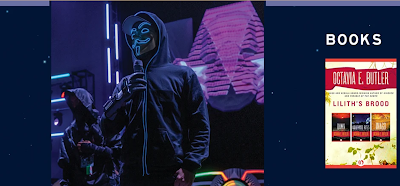DEF CON 31 had Octavia Butler's Lilith's Brood/Xenogenesis series on it's reading list next to Snow Crash. This recommendation came after the 2020 Black Lives Matter protests which brought antiracist and critical Black history topics to the forefront of public life. Cold War and genetic engineering fears appear throughout without feeling dated, and the three novels remain provocative as they are firmly steeped in the author's American upbringing in Black culture. The old and new contexts brought out the enduring richness of this landmark Black sci-fi author's work.
Lilith, the series' namesake, takes the reader through her personal salvation at the hands of an alien species. Salvation comes at a price for humanity as a whole, and it brings to mind historical and societal dilemmas of colonizers and colonized, enslavers and enslaved, and generational consequences to descendants of these groups. The aliens are the Oankali, a multi-system species of natural genetic engineers. They are collectors of genetic difference, and they use the genes they collect to improve themselves as they move from star to star. The action is driven by the aliens who claim that humanity has lost the right to earth due to their fierce intelligence combined with hierarchical nature leading to nuclear war. The humans that remain are sterilized and ushered into a breeding program where the Oankali will mix a new species that overcomes this core conflict in human nature.
Elements of Black history are recalled throughout the novels. The Oankali remove tumors from Lilith in an episode that recalls the plight of Henrietta Lacks who provided the initial cells for the first immortalized cell lines called HeLa, and consent is further challenged as it is revealed that children are produced from cell lines of dead or aging humans in the name of saving the species. Children produced from unions and admixture of alien DNA is a central point of later novels. The revulsion in humans that parent admixed children recalls discussions in the African American community of what life must have been like for enslaved people that had children by their enslavers, and it explores generational implications of such couplings for both parents and children. These are obviously informed by the author's personal experience as well as historical accounts of abuse and discrimination against those of African descent in the Americas. Those looking for similar examples that will shock and horrify you should seek out recent popular literature such as Ibram X Kendi's Stamped from the Beginning and the journalistic 1619 Project.
The speculative framework dispenses with some broader cultural discussions without feeling dismissive. The Earth has been colonized, for good or for ill, and the humans have deeply limited choices. Yet this is not a colonial narrative that lauds benevolent overseers for saving benighted natives. Humans never give up on Lilith's original plan to "Run, Hide, and Fight," and the human characters do not romanticize their plight as something fortunate. The concession the humans extract from the Oankali by creating a non-admixed human colony on Mars is explicitly called out for what it is: a glorified reservation. The damage is done to Earth, so it is incumbent for the humans to decide what to do next. The aliens, to their credit, recognize that they make mistakes and commit serial offenses even as they desperately try to integrate humans into their galactic lifecycle in a uniquely alien and much deeper way than historical colonizers have ever admitted or attempted.
After a summer of protests and lockdown reading lists, Butler's adventure on and above a remade Earth shows how deeply human power dynamics of oppressor and oppressed are. While alien pheromones strip consent and poison unions, the books never answer whether Lilith was right when she started the admixture of humans and Oankali. No one ever lets her forget her role as "the Judas goat." This is not a tale of liberation through force or thought. It is an exploration of consequence and implication when the immovable alien force overtakes a wounded people and runs up against an immovable will to be human. Even as the third book comes to a close, the admixed inhabitants of Lo establish their humanity through perseverance rather than force. Withdrawal of consent, even temporarily, becomes radical when coercion is structural, biological. These have echoes in strikes, riots and protests that rocked the US and the world. We might not have total control of our selves, our emissions, and the external implications of our purchases and relationships. But even a temporary withdrawal of consent can give us power to change the deeper structure of our evolving society.
